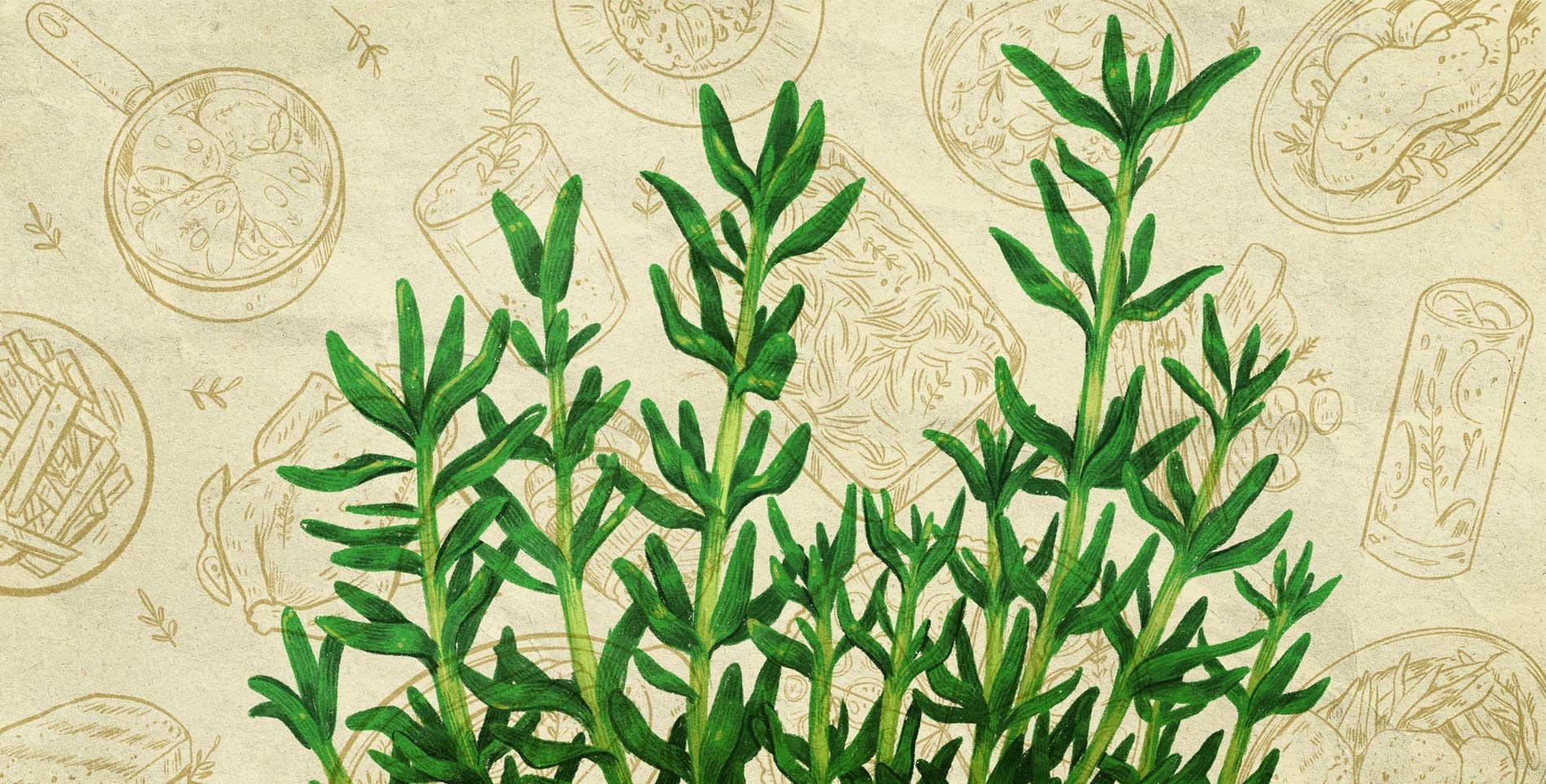
Oct. 1, 2019
Herbs: Unsung Heroes
Thyme for Recognition
In a new series exploring the culinary unsung hero category of herbs, we investigate the origins of thyme and its use in multiple cultural cuisines.
Words by Virali Dave
Illustration by Alycea Tinoyan
Editor’s Note: In this new series, we’re focusing on a class of unsung culinary heroes: the small but mighty category of herbs. Herbs can make all the difference in a dish; they’re often closely tied to multiple cuisines, intrinsic to entire cultures and cuisines. A bunch of cilantro can come in handy atop an Indian dish, and is equally important when whipping up something Mexican. Keep basil on hand when cooking Italian, and it’ll come in handy when you switch to Thai. Omit the leaves altogether, and you may notice your dish falls flat. While herbs may not take center stage, these sprouting wonders form the basis of many of our best culinary experiences. Here’s to the herbs.
Rarely would I cook without onions, garlic, salt and pepper. My mouth and mind understand these ingredients are intrinsic to a well-flavored dish, however much they may sit backstage. And yet I tend to scrimp on an equally important element: herbs. Herbs are pricey and have a short shelf life. They’re often sold in fairly large quantities, meaning that on days where I do spring for a handful of herbs, I know I’m likely to just use a few sprigs before the rest inevitably wilt and end up in my trash can. So if cilantro or basil don’t feel intrinsic to whatever dish I’m making, or if they merely serve as a garnish, I’m likely to skip them on my grocery run.
But when willing to take that extra step, I can’t deny the difference in the resulting meal. A bit of dill in my frittata makes the flavor more dynamic. A fresh sprig of basil on that bowl of rigatoni changes each bite completely. We taste herbs every day, but rarely do we think about them. What seems minimal is in fact intrinsic to the soul of a dish—to whole cuisines.
Take thyme for example. Because it is a drought-friendly perennial plant that is harvested in summer and fall, thyme is usually added to summer soups or grilled veggies and meats. It becomes associated with those summer meals, reminiscent of warm, southern Mediterranean air and cuisine.
One of the origins of the herb can be tied to is Southern France. Thyme is, after all, a staple ingredient in herbs de Provence. But it also extends beyond the Mediterranean into the Middle East; it is also a staple in za’atr, often tied to Syrian, Palestinian and Lebanese cuisines. Dried thyme is also used in Armenian tisanes. In other words, it has multiple origins—roots that make it an integral part of cuisines in various parts of the world.
Even the word thyme originates from the Greek word thumos, or the Latin word fumus, both of which mean “smoke.” Ancient Romans and Greeks used thyme in their baths and as incense, while ancient Egyptians used it in their embalming process. For the Egyptians, thyme was associated with health, vigor, strength and purity. In the Middle Ages, thyme was emblematic of courage, and women often gifted the herb to knights and other warriors, or embroidered it into scarves they presented instead. Thyme served as a protection—a boon. The Romans are the ones who are often credited with bringing thyme beyond the Mediterranean, and today there exist over three hundred varieties of the herb.
Sold fresh, it has a shelf life of a week, and is present in summertime cocktails and grilled dishes. It pairs well with tomatoes, chicken or eggplant. Dried, it holds up and becomes a key player in cuisines around North Africa, Eastern and Western Europe, and the Middle East. Toss some onto a sliced bagel with cream cheese and see what you think.
Herbs may not take center stage, but these unsung heroes form the basis of our best culinary experiences. Personally, I like my dried thyme in the form of za’atar, sprinkled generously atop a piece of toast with cream cheese. Or a fresh sprig atop a gin fizz, when I convince myself to spring for a bunch.






Our comments section is for members only.
Join today to gain exclusive access.